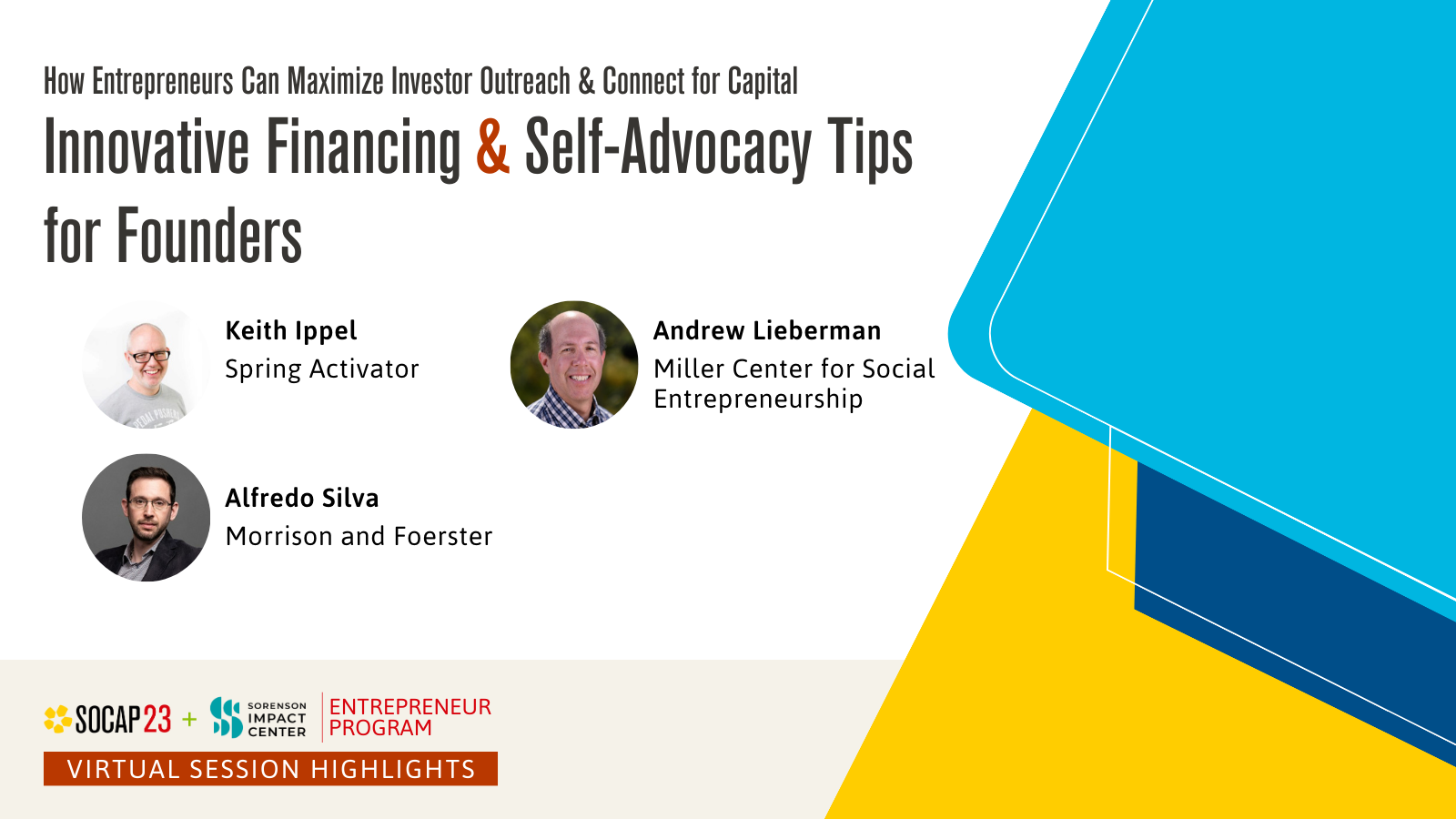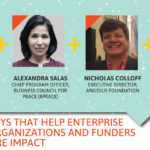How Entrepreneurs Can Maximize Investor Outreach and Step Into Their Power As Impact Founders
While scaling a social enterprise, founders are tackling some of the world’s big challenges while also seeking innovative financing solutions to scale their businesses. This year’s SOCAP23 Entrepreneur Program includes six monthly strategy tracks — including July sessions on innovative financing and self-advocacy — to help founders enhance their impact and develop a nurturing framework for their businesses.
The virtual sessions for founders are facilitated by a variety of subject matter experts. We’re grateful for the knowledge, time, and guidance they are sharing with the founders and the broader SOCAP community.
At SOCAP23, you can hear from the SOCAP23 Entrepreneur Program cohort when they present on stage about the unique challenges their companies are addressing. They’ll also be actively connected to funders through our partnership with Toniic where they will be put through an investor matchmaking process. Register now to join them October 23-25 at Yerba Buena Center for the Arts in San Francisco.
Find highlights and takeaways below from the July sessions, which provided tips on types of capital, term sheets, and the art of the ask. Previous sessions focused on business growth tools and models in June, team leadership and culture development in May, and holistic wellness in April. Watch for additional highlights in the months leading up to SOCAP23.
Types of Capital and When to Look for Each One
Presented by Keith Ippel of Spring Activator, which acts globally as a collaborative partner to guide and empower changemakers with high-impact knowledge, tools, and a network to help them thrive. Its services include training programs, capacity-building, mentorship, and advisory services.
Takeaways and highlights:
- Founders can shift their thinking about power when approaching investors and consider ways to use language for connection when discussing fair value exchange (investment for company shares). Each role in the fundraising/investment process holds power. The people with the money are looking for a return on investment, and they need founders to make that happen.
- Consider what types of capital are needed for different business stages. The timeline to raise capital typically can take six months to a year, so it’s important to keep in mind cash flow and budget assessment. Include or exclude options for types of capital and the time it will take to acquire it.
- There is no universal truth to raising capital, and the process varies by geography. Take location into account to help determine the average terms of raising capital for each stage and how that compares to need.
The Art of the Ask: How to Ask Investors for Money
Presented by Andrew Lieberman of the Miller Center for Social Entrepreneurship at Santa Clara University. With world-class programs and immersive executive mentorship, the Miller Center accompanies social entrepreneurs on their impact journeys.
Session takeaways and highlights:
- Before engaging with any type of funder/investor, it’s important to be able to articulate the “ask” — the amount and type of capital — in one sentence. Then, be able to justify the need for that amount and type of capital.
- Every type of capital has its pros and cons. Grants seem like “free” money but many times have strings attached in the form of reporting requirements. Debt can be a good option if it’s possible to pay back the loan plus interest. Equity may seem like another form of “free” money, but it means giving away a percentage of company control.
- Investors are actually not risk-takers — their job is all about minimizing risk. Be sure to showcase why investing in your businesses or organization is not risky.
Term Sheets for Investor Negotiations
Presented by Alfredo Silva of Morrison and Foerster, an international law firm that shapes powerful legal strategies for businesses that provide clarity around risk and confidence in the chosen path. By pairing diversity of perspective with a strategic consultative approach, Morrison and Foerster helps foster trusted partnerships.
Session takeaways and highlights:
- An overview of three main alternatives for fundraising: equity investments, convertible debt investments, and SAFE.
- Equity investments generally require more documentation and due diligence than convertible debt. The amount of due diligence needed to make a final investment in equity means legal fees are usually higher.
- Convertible debt investments typically include a built-in method for exit/payback. With this structure, legal fees are lower and investors generally are paid back earlier than for equity investments.
- SAFE: No interest is accrued and no maturity date is used. There are sometimes conversion discounts of about 20%. The investment is repayable or converted into common stock with a valuation cap.
- Watch for marketing terms while raising capital. Stick to language such as SAFE, preferred stock, or convertible debt rather than seed series or preseed series. A wider range of enterprises are looking for funding beyond series A or series B, which affects the valuation conversation.
- Have a concise pitch deck that showcases the team and plan. Do research to identify investors in similar spaces, sectors, or geographies. Be sure to identify the investment fund manager who can help provide connections to the target audience.
- Check to see when VCs and funds made their last deal, as they might take meetings but aren’t open to investing.






